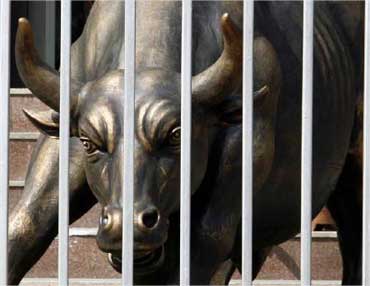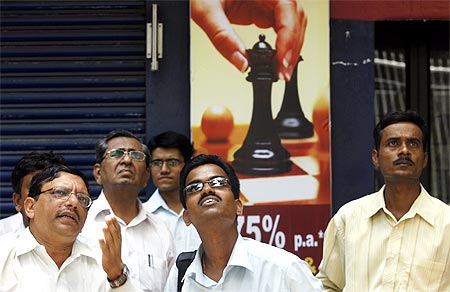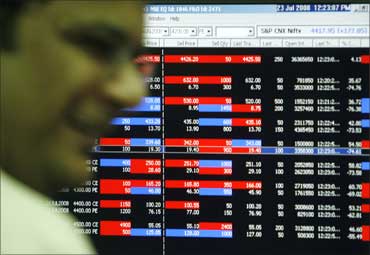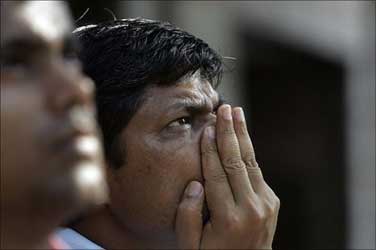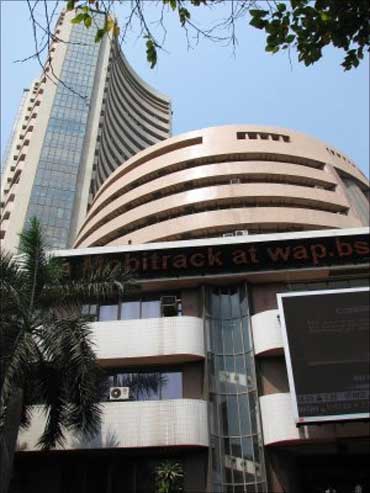 | « Back to article | Print this article |
Dalal Street shows 'care a damn' attitude to terror strike
Showing resilience and a care a damn attitude towards the terror strike in the city, it was business as usual in the stock market on Thursday.
At the same time, the market participants assured the investors from the country and abroad about Indian markets' strength and vibrancy to get over such unfortunate events.
The BSE Sensex ended up 22 points at 18,618, while the Nifty closed up at 5,599. The experts said that markets have time and again shown that such terror strikes would not have any material impact, as they cannot dent the general functioning of the economy.Late selling following reports of a lower-than-normal rainfall in the last two weeks wiped out entire gains of the benchmark indices. The Sensex opened 30 points lower amid weak global cues, and soon touched a low of 18,449.
However, the markets thereafter remained resurgent for most part of the day and brushed off slightly disappointing inflation numbers.
The Sensex recovered 354 points to a high of 18,803 on the back of buying in rate sensitives.
However, weak monsoon data took its toll on investor sentiments and the index erased all the gains, ending finally at 18,618 - up 22 points. The NSE Nifty ended up 14 points at 5,600.
India's Met department said, that monsoon rains were 19 per cent below normal in the week ended July 13.
Click NEXT to read more...Dalal Street shows 'care a damn' attitude to terror strike
The country's two main bourses -- the Bombay Stock Exchange and the National Stock Exchange -- today opened at their scheduled time and business was normal.
After a 145-point decline in early morning trade, the Bombay Stock Exchange benchmark Sensex bounced back soon and was seen trading with gains of over 100 points.
Meanwhile, Asian markets ended on a mixed note today. Nikkei slipped 0.3% on fears that Moody's can cut the United States' triple-A credit rating.
The $ touched multi-month lows. Hang Seng ended flat while Shanghai Composite edged up 0.5%. Italy's debt worries have taken major markets in the Europe down 0.5% each. Meanwhile, the government came out with June inflation figures.
Inflation for the month stood at 9.44% compared to 9.06% in April and WPI primary articles index was at 2.8% on a month-on-month basis. The interest rates sensitive sectors seemed to have discounted the spike in inflation numbers.
Click NEXT to read moreDalal Street shows 'care a damn' attitude to terror strike
Analysts said that the early morning loss was not because of the last evening's terror attack and the markets opened weak largely because of weak cues from other Asian markets.
"Yesterday's terror attack had not much of an impact on today's market movement. Market opened on a lower note on the back of weak Asian cues. Life has got back to normal in Mumbai," Way2Wealth Brokers COO Ambareesh Baliga said.
In other news, the terror attacks in Mumbai were not attacks on India's financial markets, Home Minister Chidambaram said today. In Wednesday's serial blasts across the city, at least 21 people have been confirmed dead and 141 injured.BSE IT index slumped 1.5% to 5,835 ahead of the second major results today. TCS shed 2.2% at Rs 1,125. Infosys has not recovered post results and was down 1.5% at Rs 2,741.
"The overall trend for Infosys has been weak. However, we expect support at Rs 2680/2700 levels. On the higher side, it will face a lot of resistance between Rs 2880/2900 levels," said Rajesh Jain, EVP & Head - Retail Research, Religare Securities.
Click NEXT to read more
Dalal Street shows 'care a damn' attitude to terror strike
"The city was not totally paralysed because of the terror attack which is why the stock market started operation on a normal note," he noted.
Recalling the serial blasts of 2008 in the country's financial hub, Baliga said that the markets bore a dim look initially at that time, but later bounced back.
"The attacks are not going to fundamentally damage anything. Historically, whenever there is these attacks, markets have generally bounced back and closed in the positive zone," Ashika Stock Brokers Research Head Paras Bothra said.
Meanwhile, BSE realty index ended with 2.2% gains after touching an intra-day high of 2,222. Bankex, healthcare and metal indices moved up around 1% each.ICICI Bank contributed around 20 points to index's upmove through the day. HDFC Bank and SBI were up over 1% each.
Yes Bank added 2.3% on back of news report that the bank has collaborated with Indian Council for Agricultural Research and Punjab Agriculture University to design a customised agriculture insurance product for corn growers in Punjab.
Click NEXT to read more...
Dalal Street shows 'care a damn' attitude to terror strike
Foreign investors are not likely to get perturbed by these kind of attacks, he added.
In July 11, 2006, when explosions on passenger trains in the city killed 187 people and injured more than 800, the country's benchmark sensitive index Sensex closed with gains of 315 points at 10,930.04 points the following day.
Similar was the case during the November 26, 2008 attack, when gunmen targeted luxury hotels, including Taj Mahal Palace & Tower and Oberoi, a railway station and a Jewish centre. In the following trading session (November 28, 2008) Sensex closed higher by 66 points at 9,092.72 points.
Home Minister P Chidambaram also said that attacks were not aimed at financial markets and that high population density were chosen as targets.
DLF was the big mover in the realty space - up over 3% at Rs 234. Metal names like Jindal Steel, Hindalco as well as auto stocks - Tata Motors and Maruti moved up. Market heavyweight, Reliance, ended flat at Rs 867.
Meanwhile, Bajaj Auto dropped 1.3% at Rs 1,431 after posting its Q1 numbers. The two-wheeler maker has reported 21% growth in net profit at Rs 711 crore for Q1FY12.
The company had a net profit of Rs 590 crore in the June quarter of the previous fiscal.
Reliance Communications shed 1.5% at Rs 97.
Other communications stocks were sligtly better off with Bharti Airtel ending up 0.5% at Rs 396. MTNL edged up 0.7% at Rs 44.
